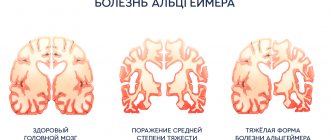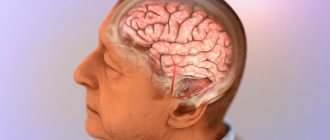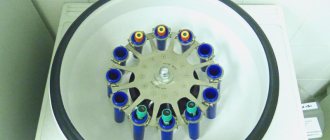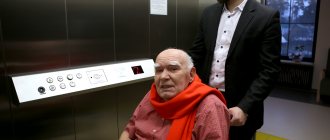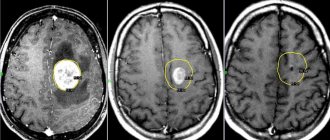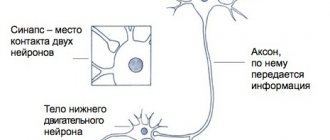With age, people begin to notice that their memory is not as good as before, and it becomes more and more difficult to concentrate on any task. The absent-minded state can go away on its own as stress is overcome, or it can be one of the symptoms of pathology - Alzheimer's disease.
The diagnosis was first described in detail in 1906. The disease affects the nervous system, causes the death of brain cells, and is chronic. This is one of the causes of dementia (senile dementia). According to Rosstat, in Russia more than 44 million people constantly live with this problem.
Timely diagnosis and proper treatment can significantly slow down the development of pathology and preserve the patient’s quality of life for a long time. In our clinic you can undergo the necessary examinations. MCB doctors will confirm or refute the diagnosis, advise on prognosis, and help you choose the treatment that is right for you.
Causes of the disease
There is no exact answer to the question about the causes of the pathology. Early-onset Alzheimer's disease may first appear before age 65 and is hereditary. Such cases account for about 5% of the total. If anyone in the family has already been diagnosed, you should seek advice from a geneticist.
Late-onset Alzheimer's disease is more common. The disease affects older people over the age of 65. The pattern of development of the pathology has not been identified. Although the essence of Alzheimer's disease is well known, it is impossible to say exactly why one person suffers from the pathology, while another maintains a clear mind even in old age.
According to the global Alzheimer's Association, several genes have been discovered that increase the risk of developing the disease:
- APOE allele e4 (risk gene) - every fourth case;
- determining gene (heredity, autosomal dominant Alzheimer's disease) - less than 1% of cases, only 1 confirmed diagnosis in the world.
Scientists suggest that the state of the nervous system is influenced by heredity, the environmental environment, and the patient’s lifestyle. The main risk factor is age. Other causes include midlife depression and smoking.
At the same time, a healthy lifestyle, proper nutrition, and regular physical activity have a beneficial effect on the body’s condition, but do not exclude the development of Alzheimer’s disease. Decades before the first symptoms appear, pathological changes already begin in brain cells. Amyloids and tau proteins are formed in tissues, blocking the function of nerve structures. Gradually, non-functioning cells die.
Other possible reasons:
- cardiovascular diseases;
- diabetes, excess weight;
- elevated cholesterol levels;
- hypertension;
- traumatic brain injuries.
Train your brain with crossword puzzles or computer games
Brain training is based on the idea that it can be compared to muscles: it can change over time, responding to what we do with it - to become stronger or weaker. In science this is called neuroplasticity. They began to really actively study this method only in the 2000s, although the first breakthrough happened back in 1958, when the German psychologist Wayne Kirchner came up with the famous “n-back problem.” Its essence lies in the fact that a person is shown a set of certain sound, visual or other images.
As he solves the problem, he must indicate how many positions ago he already saw or heard the image being presented. Thanks to research carried out in 2008 and 2010 by brain scientist Suzanne Yeggi and her colleagues, it was found that systematically performing the “n-back task” quite quickly can significantly improve concentration, logical thinking indicators and even project the results of regular exercise. training for other types of mental activity that were not initially involved.
Later it turned out that those who completed such tasks formulated their thoughts more clearly, were able to carry on a conversation, read faster and achieved better results in their professional activities.
Thanks to the development of modern technology, exercises like n-back problems and many other games aimed at improving cognitive functions are now available on various websites and in special applications. The very first search query will give you a dozen such options for training your brain - and in the form of exciting and colorful games, rather than boring exercises.
There are already the first studies of the effectiveness of such virtual exercises: those who trained their brains at least once a week thought 9.8% faster and solved 5.8% more mathematical problems correctly, and their visual-spatial memory was 2 .7% better than people who did not purposefully develop their brains.
By the way, viewing information on the Internet, as scientists recently found out, is also useful, and to a greater extent for the elderly. If for people under the age of 40–50 social networks are more likely to cause depression, then after 55 years old it’s time to go online more often.
A study from the University of California at Los Angeles, which examined the degree of activity in different areas of the brain in older adults, confirmed that men and women who surfed and chatted for at least half an hour a day had more activity in the areas of the brain responsible for speech, memory, vision, and decision making.
are also useful ! For example, the so-called “shooters” or “shooters”. By forcing players to simultaneously perform a number of different tasks (spotting new enemies, tracking the actions of existing ones, avoiding their attacks and bullets, etc.), these types of video games push three different aspects of visual attention to the limit. After just ten days of game training, this significantly affects the ability to perform new, unusual tasks and operate in unprepared terrain.
You can also use more conservative mental training: for example, solving crossword puzzles, playing Sudoku or cities, coming up with words for each letter of the alphabet. Another effective option is chess: in this game you need to calculate moves in advance (both your own and your opponent’s), think through a strategy for interacting with the second player... In general, there are a lot of calculations, and this is a load on working memory and maintaining it in an active state.
Symptoms of Alzheimer's disease
The first sign of pathology is often memory impairment. The patient forgets names and faces, and it becomes difficult to find the right word in a conversation. When a person begins to notice memory deterioration with age, this is rarely paid attention to, associating the changes with the aging of the body. Gradually, the necrosis of brain cells spreads, and difficulty in performing daily activities is added to forgetfulness: cleaning the house, washing clothes, preparing food, etc.
In people engaged in intellectual work, symptoms of Alzheimer's disease appear later. Their brains are better able to adapt to change. In the early stages, the pathology may manifest itself as difficulty in choosing words during speech, difficulties in orienting in familiar terrain. Later, a noticeable decrease in memory occurs.
Other characteristic symptoms include:
- difficulties understanding spoken speech and written text;
- personality changes noticeable to close people;
- violation of the concept of time;
- difficulties with writing texts.
As Alzheimer's disease progresses, it turns into severe dementia, and the manifestations of the pathology vary from person to person.
Features of the course of the disease
In the early stages of Alzheimer's disease, the patient himself becomes aware of memory problems and tries to cope with them and carry out everyday activities. Diagnosis of pathology at this stage gives the most favorable prognosis. If a person does not notice deterioration, close people can help him with this.
As the pathology develops, obvious changes in the patient’s behavior are observed:
- often repeats itself in conversation, tells the same story several times;
- forgets answers to previously asked questions and asks them again;
- while going to the store, makes spontaneous purchases and acquires a lot of unnecessary things;
- spends more time on household chores and copes poorly with his daily responsibilities;
- loses the ability to learn, cannot acquire new knowledge and skills, for example, cannot cope with a new door lock;
- more often suffers from depression, apathy, refuses to meet with friends and go on visits;
- devotes less time to his appearance, allows sloppiness and sloppiness in his wardrobe.
Against the background of previous behavior, new habits are clearly visible, even if the patient first tries to hide his problems from others. Over time, the ability to self-criticize is lost, and memory loss becomes obvious. The patient begins to forget the names and faces of family members, does not remember his own last name, and loses orientation in space and time. An older person with late-stage Alzheimer's disease may no longer be aware that anything is wrong with them. Basic self-care skills disappear; assistance is needed when eating, going to the toilet, and changing clothes. Periods of clarity of consciousness occur less and less often.
Caring for older people with Alzheimer's disease
Elderly patients with this disease require constant care and assistance with simple everyday activities. While the disease is mild, this is easy to do, but with severe Alzheimer's disease in older people, the constant presence of a caregiver is necessary. It is very important that the person caring for him understands that his ward is in a state of stress every day and is subject to difficult emotional experiences. Here are some helpful tips for caring for an elderly person with dementia:
- Water procedures.
- Wardrobe items.
- Compliance with hygiene rules.
- Visiting the toilet.
As a rule, old people do not like them very much, sometimes they are even afraid, so they can shout, show dissatisfaction and even aggression, and behave rudely.
Why is this happening? Often an elderly person simply does not understand what is being done to him and why, perhaps he is embarrassed or cold, and therefore behaves inappropriately. Below are some tips to help make bathing your elderly pet easier:
— Place all the necessary items nearby: shampoo, soap, washcloth, towel. Make sure the water is not very hot or cold, otherwise the patient may get scared. The room should also be warm enough, but not hot.
— In the bathroom, everything should be provided for the convenience of an elderly patient: handrails on the wall and in the bath itself, a bench (or a special chair), rubber mats (so that the feet do not slip). Do not fill the tank too full and under no circumstances leave your child alone while bathing.
— Try to keep the elderly person occupied with something while taking a bath, give him a bottle of shampoo or something else and let him hold it.
“Many old people get very nervous about having to completely undress. To help the person feel comfortable, cover them with a towel while they get in or out of the bath.
- It is not at all necessary to take a bath every day. Instead of bathing, it is enough to wipe the elderly person under your care with a towel soaked in water.
— To ensure that as little water as possible gets on your face when washing your hair, lather your hair with a flannel piece or a small soft sponge.
It is always very important for a person how he looks. Alzheimer's disease in older people causes memory impairment, as a result of which the patient may simply forget how to put on a particular item of clothing, panic, and even get angry because of it.
If there is too much clothing, an elderly patient may become confused and nervous. Therefore, it is better to leave at his disposal a minimum amount of the most necessary things.
Arrange your wardrobe items in the exact order in which you want to wear them. If an elderly person already has a severe form of illness, be sure to help him, give him each item and accompany it with a comment: put on a sweater, put on trousers. But just don’t describe the whole process with one general word “get dressed”; for the patient this is a difficult task. And do not rush him under any circumstances, he will get agitated and may begin to behave inappropriately.
Each item of clothing should be easy to put on and take off. Many elderly patients, for example, cannot fasten a zipper, so it is better to have buttons or even Velcro on things. The sole of the shoe should not slip, take care of this too.
Alzheimer's disease in older people is accompanied by memory impairment, so they often simply forget how to take care of themselves, tidy up their hair, nails, face, etc. A person does not remember what scissors or, for example, a comb are for.
Do not try to cut an elderly patient’s hair yourself if he has always gone to the hairdresser to do this. Let him continue to visit her, but with an escort. Or invite a master to your home if leaving the house has become a difficult ordeal for a person due to illness. In addition, let him continue to use his favorite perfume, cream or other cosmetic products.
Help your elderly person perform the necessary hygiene procedures, show by example how to comb your hair, and gently encourage him to do the same. Don't let the old man use dangerous objects like scissors or razor blades; buy him an electric razor and a cardboard file.
Often, after undergoing a course of antibiotic treatment, the patient may suffer from incontinence and also have problems with the functioning of the digestive tract. Older people with Alzheimer's disease sometimes simply do not feel the body's natural urges. Or a person forgets how to get to the toilet in his own home. Talk to your doctor if such manifestations occur, find out their causes.
Make sure that there are no unnecessary objects on the way to the toilet that would impede your passage. In addition, the things that an elderly patient is wearing should be removed without much effort.
Regularly tell your client that it is time to go to the toilet. And put some eye-catching signage on the door, or even paint the entire door a bright color. This will become an unnecessary reminder for a person.
Gradually, you will understand how often the patient walks on his own, and you will remind him about the toilet at the appropriate time and accompany him there. Elderly people with Alzheimer's disease may be encouraged to use a commode chair. It is good if a person does not drink a lot of liquid at night. Otherwise, you will have to regularly get up to go to the toilet at night on an alarm clock.
Put a diaper on the patient, or cover him with a diaper or cellophane.
Alzheimer's disease in the elderly is a difficult ordeal not only for the elderly themselves, but also for their family members. It is not always possible to leave work, forget about your own life and devote all your time to caring for the patient. For such cases, a good solution is to place an elderly relative in a special institution.
A patient in a private nursing home will be provided with:
- supervision and necessary assistance around the clock;
- well trained experienced staff;
- all the devices necessary for a sick person: lifts, wheelchairs, bath or shower seats, handrails on stairs, in corridors and toilets;
- a well-thought-out diet, taking into account the individual characteristics of each patient;
- assistance in feeding techniques to exclude the development of aspiration pneumonia;
- dishes at the optimal temperature (because patients often stop feeling cold or hot normally);
- the opportunity to have an interesting time, visit exhibitions, theaters, watch TV, take part in special classes (individually or with a group);
- comfortable and cozy rooms to stay;
- walks in the developed area adjacent to the establishment.
In private boarding houses for elderly people with Alzheimer's disease, all conditions are provided for a comfortable stay for patients, and the likelihood of complications is minimized.
We recommend
“The cause of dementia, its symptoms and treatment” Read more
Diagnosis of Alzheimer's disease
When the first symptoms appear, you should consult a general practitioner, family doctor or neurologist. The patient is recommended to come to the appointment with a relative who can describe changes in behavior from the outside. The patient cannot always adequately assess his condition and often does not tell the doctor important facts.
Diagnostic procedure:
- Anamnesis collection. The doctor finds out what kind of life the patient leads, finds out his habits, place of work, what illness he had, and whether there is any family history.
- Analysis of clinical symptoms. You need to talk about your complaints and observations. The specialist will ask how long ago and with what intensity the symptoms of the disease have been increasing. It is better to keep a diary of observations from the first changes and show it to the doctor at the appointment.
- Assessment of the patient's condition at the time of consultation. The doctor conducts a cognitive test for attentiveness, memory, ability to navigate in space, and perform tasks. When assessing the actual condition, the patient’s level of education and the presence of concomitant pathologies, for example, hearing impairment, are taken into account. Tests such as the Mini Mental State Examination (MMSE) are used to determine the degree of dementia.
At the first appointment, a primary diagnosis of Alzheimer’s disease is carried out according to the algorithm described above and additional examinations are prescribed:
- General blood test and hormone levels. Based on the results, the doctor determines the presence of other diseases that can cause memory loss, for example, thyroid dysfunction, anemia, vitamin deficiency and others.
- Blood test for infections, HIV, syphilis. Treatment of diseases will help improve memory and get rid of other disturbing symptoms.
- Consultations with doctors of other specialties. To correctly diagnose Alzheimer's disease in the elderly, a conclusion from a geriatrician, psychiatrist, or neurologist may be required.
- Magnetic resonance or computed tomography of the head. The images show brain tissue and structures. Based on the examination results, pathologies such as hydrocephalus, stroke, and neoplasms are excluded.
- Neuropsychological examination. Patients with early-onset mild dementia undergo special tests to find out what type of memory impairment is present.
A comprehensive analysis of the examination results allows us to establish a diagnosis.
Traditional criteria for Alzheimer's disease:
- clinically confirmed dementia;
- impairments in 2 or more cognitive areas;
- preservation of consciousness;
- gradual decline in memory and other functions;
- age after 40 years;
- absence of brain diseases and systemic pathologies that can affect the functioning of the nervous system.
The National Institute for the Diagnosis of Age-Related Alzheimer's Disease guidelines also list characteristic biomarkers:
- beta-amyloid proteins in the brain, visible on PET scans;
- low levels of beta-amyloid and increased levels of tau protein in the cerebrospinal fluid;
- local atrophy of the temporal lobes and medial parietal cortex on the tomogram.
Get enough sleep
Adequate sleep is very important. It is needed for the formation of memory and attention, and its deficiency can cause serious intellectual and emotional difficulties. Sleeping less than 8 hours, according to research from the University of Rochester Medical Center, negatively affects the unique process of self-cleaning of the brain, which was discovered by scientists in 2012. As a result, toxic proteins (beta-amyloid and tau protein) accumulate in the brain tissue, an increase in the level of which is observed in Alzheimer's disease.
Treatment of Alzheimer's disease
The earlier neurodegenerative changes are detected, the more effective the treatment. The therapy will preserve the patient’s intelligence and memory for a long time. Changes slow down, the patient and his family have time to adapt to the new way of life.
To treat the disease, drug therapy and measures to improve brain activity are prescribed. Depending on the patient’s condition, medications are selected to stabilize the mental state, to maintain the functioning of nerve cells (increasing the number of neurotransmitters, inhibiting cholinesterase), to eliminate concomitant pathologies.
To preserve intelligence, patients are recommended to:
- engage in creativity;
- actively carry out daily activities with other family members;
- communicate with friends and relatives;
- care for flowers in the garden or pets;
- increase physical activity (long walks in parks, walking, dancing, classes in groups for older people, etc.);
- play musical instruments, sing, etc.
Constant communication helps a person maintain attention, speech, and the ability to understand other people. Close relatives are advised to be patient and not show irritation from the patient’s forgetfulness or from his sometimes inappropriate remarks and questions. In order for a person to better understand the speech addressed to him, he needs to speak in short, simple phrases.
It is important to maintain your usual lifestyle as much as possible. If the patient was involved in painting or sports before diagnosis, he should continue to the best of his ability. Positive emotions have a beneficial effect on the health of the nervous system.
The disease progresses slowly. After diagnosis, a patient with high-quality drug support can live for many years. Late-stage Alzheimer's disease cannot be cured. The average life expectancy after immobilization is 6 months. Palliative care is indicated.
Keeping your brain active
It has been proven that the incidence of Alzheimer's disease in uneducated people is significantly higher than in people with higher education. Constant self-education can also prevent Alzheimer's or delay its onset.
Regular acquisition of new knowledge and activities that require reflection, a logical approach and memory work helps prevent the development of atrophic processes in the brain. For such purposes, both regular crossword puzzles and Sudoku, as well as learning new languages and mastering musical instruments, are suitable. Even enjoyable activities like watching feature films and reading books help prevent neuronal damage.
If your health allows, it will be useful to postpone retirement until a later time (especially if the work involves mental activity), which will help prevent a premature decline in brain activity. But even pensioners should not fall into apathy and constantly develop, travel, learn new things and communicate with other people.
Prevention of Alzheimer's disease
The medical community has not yet provided convincing data. Prevention of Alzheimer's disease essentially comes down to eliminating precipitating factors.
The risk of developing pathology is reduced in the following cases:
- maintaining intellectual stress in old age: solving crossword puzzles, mastering new skills;
- prevention of hypertension;
- maintaining good physical shape;
- lowering blood cholesterol levels;
- proper nutrition including foods rich in saturated fats and omega-3 fatty acids.
Preventing dementia
Reducing the risk of developing Alzheimer's disease
Josh Mitteldorf, Preventing Dementia
Translation by Evgenia Ryabtseva, portal “Eternal Youth” For links, see the original article.
Dementia develops unexpectedly. People suffering from it feel like helpless hostages of their genes. However, this is a misconception. How much does the feared ApoE4 gene increase the risk of developing dementia? This cannot be determined using precise mathematical calculations, since this correlation depends on many lifestyle factors that are no less important than genetic characteristics. Women who inherit ApoE4 from one parent double their risk of developing Alzheimer's disease, but this effect can be easily modified by diet, exercise, and nutritional supplements. For men, the effect of one copy of ApoE4 is so small that it has virtually no effect on the level of risk. For women and men who have two copies of ApoE4, the risk of developing Alzheimer's disease is very high, but even then, factors within a person's control can significantly improve the situation.
Listed below are factors that, according to the author’s opinion based on an analysis of literary sources, can significantly reduce the risk of developing senile dementia even in the presence of a genetic predisposition.
1) physical activity (they are the most important);
2) mental stimulation and social factors;
3) metabolic syndrome/insulin sensitivity;
4) diet;
5) drugs and food additives that selectively affect the brain.
Physical exercise
At the beginning of the analysis, the author assumed that the most important factor would be No. 2 from the list above. For longevity, social contacts are more important than anything else, so we can assume that this pattern is even more relevant for maintaining brain health in old age.
However, unexpectedly, mental stimulation and social factors were found to be effective in some studies but not in others. Factor No. 1 turned out to be the undisputed leader in the processing of literary sources.
There is strong evidence that exercise reduces the risk of developing dementia. The most revealing are the meta-analysis published in 2011 and the review of literature published in 2021. A moderate amount of physical activity is much better than lying on the couch. Regular visits to the gym are even better, but the severity of the positive effect is not proportional to the increase in the intensity of the load.
Social relationships and mental stimulation
The most convincing study that identified a relationship between social factors and slowing cognitive decline was conducted in 2001. A team of scientists from the University of California at Los Angeles followed 1,200 women and men for more than 7.5 years and concluded that the most important social factor was “emotional support.”
However, subsequent studies have not confirmed the importance of emotional support. In the 2010 review, no social variables were listed as protective factors. And a 2016 study found that there was a relationship between social connections and baseline levels of cognitive function in midlife, and no relationship between changes in cognitive functioning over a 20-year period.
Diet
Of the several diets that have been tested for neuroprotection, the best described is the MIND (Mediterranean-DASH Intervention for Neurodegenerative Delay diet), developed by Martha Morris of Rush University in Chicago. According to Morris, this diet reduces the risk of developing Alzheimer's disease by 50%. The MIND diet is a variant of the Mediterranean diet (the letter M in the name is taken from the English word Mediterranean - Mediterranean). The main components of the Mediterranean diet are leafy greens, berries, nuts, fruits, vegetables, olive oil, whole grains and fish as a source of protein and omega-3 fatty acids. The MIND option focuses on blueberries and walnuts, which are supposed to be particularly beneficial for the brain. [For more information, visit WebMD.]
Regular coffee consumption is associated with a modest increase in risk, but tea, especially green tea, has a much better reputation. A Japanese study demonstrated a significant positive effect on cognitive function from drinking large amounts of green tea. Caffeine appears to have moderate neuroprotective effects, but most of the benefits of tea are due to the catechins or polyphenols found in decaffeinated tea. Green tea is a component of the MIND diet.
Metabolic syndrome
An association between metabolic syndrome and Alzheimer's disease was first identified 20 years ago. Observations showed that insulin therapy exacerbated the risk, and indeed, excess insulin appears to be a key factor in this association. Metformin is a standard treatment for diabetes, and one study showed that taking metformin reduced the risk of developing Alzheimer's disease in people with diabetes to levels comparable to those of the same age without diabetes. However, another study found that metformin actually increases the risk of developing Alzheimer's disease. A fairly compelling hypothesis is that metformin depletes vitamin B12 stores. This vitamin is essential for the functioning of neurons and is therefore concentrated in brain tissue. Many people suffer from B12 deficiency even without taking medications, so metformin should always be used in combination with B12. Whether there is a residual risk of developing Alzheimer's disease from metformin even with B12 remains to be seen, but it may be that B12 should not only be prescribed to patients taking metformin. Low protein diets protect against many aspects of aging and the MIND diet is also predominantly vegetarian. B12 is an important compound that can be obtained from plant foods.
Medicines, hormones and nutritional supplements
The most common pharmaceutical approach is to increase the concentration of the neurotransmitter acetylcholine. Acetylcholine is found wherever there are nerves and is essential for cognitive function, sensation, motor control, and especially memory. Alpha-glycerylphosphorylcholine is a precursor to acetylcholine that can be taken orally. A study was conducted in which 132 patients with Alzheimer's disease who took a drug of this compound showed improvement in symptoms after 90 and 180 days from the onset of the disease, compared with the deterioration observed in patients in the placebo group. However, it is not yet clear exactly what effect alpha-glycerylphosphorylcholine has: nootropic or neuroprotective. A bibliography on this subject can be found at Examine.com.
Another potential anti-aging agent is the angiotensin receptor blocker class of drugs. The most famous of them is losartan. There is scientific evidence that taking drugs in this class reduces the risk of developing Alzheimer's disease by 25%, and in experiments on mice they have demonstrated the ability to increase life expectancy. The mechanism of action of these drugs is to relax the walls of the arteries and lower blood pressure, which weakens the severity of the processes leading to the development of all diseases of the cardiovascular system. However, people do not like to take these drugs, since taking them is often accompanied by apathy and weakness. Some patients develop a cough. Telmisartan has the least number of unwanted side effects among drugs in this class.
Both male and female sex hormones have a protective effect against dementia. A moderate way to use this effect without taking sex hormones is to take dehydroepiandrosterone. Levels of this hormone decrease with age, and its serum levels are lower in patients with Alzheimer's disease, which suggests a possible beneficial effect of the drug, but does not prove it.
Pregnenolone is another hormone precursor; in fact, the body synthesizes dehydroepiandrosterone from pregnenolone. Its concentration in the body also decreases with aging. Studies in mice have shown that pregnenolone improves memory retention in a feedforward model. However, evidence for its neuroprotective effect is lacking.
Poor sleep quality, sleeping more than 8 or less than 7 hours a night, and sleep apnea are risk factors for dementia. Their effect is large, but there is little data on this issue. In Alzheimer's disease, sleep is typically disrupted, with melatonin levels reduced and out of sync with the circadian cycle. It is natural to come to mind to test the effectiveness of melatonin-containing nutritional supplements, and there is already evidence of limited success with melatonin in the treatment of Alzheimer's disease. No data could be found on the possible preventative effects of melatonin, but the use of alternative pharmaceutical sleep aids is associated with an increased risk of developing the disease.
"Encouragement Award"
The dietary supplements listed below are believed to have neuroprotective or nootropic effects, or a combination of both.
Mainly nootropic effect
- Bacopa
- Gingko biloba
- Ginseng
- Gotu kola (Centella asiatica)
- Huperzine
- Piracetam
- Lion's mane mushroom (crested hedgehog)
Mainly neuroprotective
- Acetyl-L-carnitine
- Ashwagandha
- Black cumin
- Curcumin
- Ginger
- Omega-3 fatty acids
- Alpha lipoic acid
Hope for the Twice Unlucky
One in 50 people has 2 copies of the ApoE4 gene. Their age-adjusted risk of developing dementia is more than 10 times higher, regardless of gender. There is a theory that keeping your blood cholesterol levels low can eliminate this risk entirely. This theory is based on the results of mechanistic analysis and extrapolation of the strange fact that in Nigeria, while the occurrence of the ApoE4 gene is highest, there is no increase in the incidence of dementia. It has recently been suggested that carriers of the ApoE4 gene should eat more omega-3 fatty acids than other people.
In the author's opinion, the most significant study of Alzheimer's disease was conducted by Dale Bredesen of the Buck Institute, who applied highly personalized treatment protocols to 10 patients with Alzheimer's disease, which allowed for radical improvements in the level of cognitive function in 9 out of 10 participants. This impressive example demonstrates the power of medical science when bureaucratic barriers are removed and doctors are given sufficient time to work individually with patients.
In this case, Breseden's work offers promising hope that the beneficial effects of the approaches described above are cumulative and that carefully selected individual programs that include them can delay the development of Alzheimer's disease for many years.
